Related Research Articles

Bolivia, officially the Plurinational State of Bolivia, is a landlocked country located in western-central South America. It is bordered by Brazil to the north and east, Paraguay to the southeast, Argentina to the south, Chile to the southwest, and Peru to the west. The seat of government and administrative capital is La Paz, which contains the executive, legislative, and electoral branches of government, while the constitutional capital is Sucre, the seat of the judiciary. The largest city and principal industrial center is Santa Cruz de la Sierra, located on the Llanos Orientales, a mostly flat region in the east of the country.

The president of Bolivia, officially known as the president of the Plurinational State of Bolivia, is head of state and head of government of Bolivia and the captain general of the Armed Forces of Bolivia.
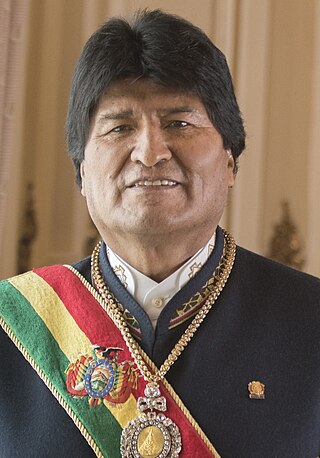
Juan Evo Morales Ayma is a Bolivian politician, trade union organizer, and former cocalero activist who served as the 65th president of Bolivia from 2006 to 2019. Widely regarded as the country's first president to come from its indigenous population, his administration worked towards the implementation of left-wing policies, focusing on the legal protections and socioeconomic conditions of Bolivia's previously marginalized indigenous population and combating the political influence of the United States and resource-extracting multinational corporations. Ideologically a socialist, he has led the Movement for Socialism (MAS) party since 1998.
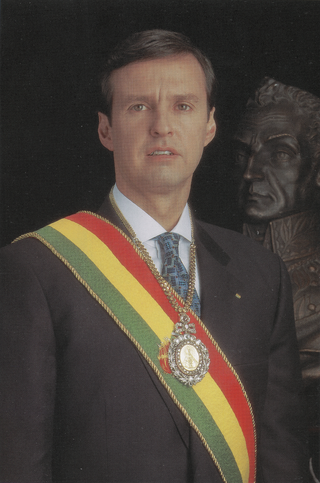
Jorge Fernando Tuto Quiroga Ramírez is a Bolivian industrial engineer and politician who served as the 62nd president of Bolivia from 2001 to 2002. A former member of Nationalist Democratic Action, he previously served as the 36th vice president of Bolivia from 1997 to 2001 under Hugo Banzer and as minister of finance under Jaime Paz Zamora in 1992. During the interim government of Jeanine Áñez, he was briefly appointed from 2019 to 2020 as the country's international spokesperson to denounce alleged human rights violations by the previous government.

Ismael Montes Gamboa was a Bolivian general and political figure who served as the 26th president of Bolivia twice nonconsecutively from 1904 to 1909 and from 1913 to 1917. During his first term, the Treaty of Peace and Friendship with Chile was signed on 20 October 1904.
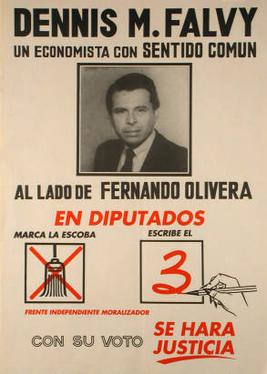
The Independent Moralizing Front was a Peruvian political party. At the legislative elections, 8 April 2001, the party won 11.0% of the popular vote and 11 out of 120 seats in the Congress of the Republic. Its presidential candidate at the elections of the same day, Luis Fernando Olivera Vega, won 9.9% of the vote. It was allied with former Peruvian president Alejandro Toledo's party, Peru Possible.

The Movement for Socialism, officially the Movement for Socialism – Political Instrument for the Sovereignty of the Peoples, is a socialist political party in Bolivia. Its followers are known as Masistas.
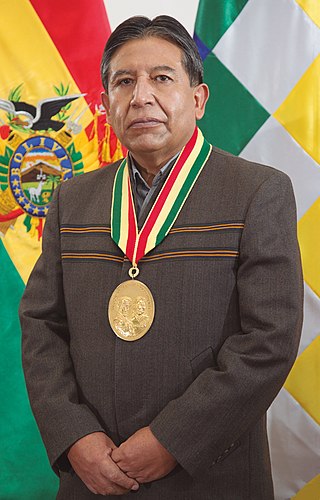
David Choquehuanca Céspedes is a Bolivian diplomat, peasant leader, politician, and trade unionist serving as the 39th vice president of Bolivia since 2020. A member of the Movement for Socialism, he previously served as minister of foreign affairs from 2006 to 2017 and as secretary general of ALBA from 2017 to 2019.

The pink tide, or the turn to the left, is a political wave and turn towards left-wing governments in Latin America throughout the 21st century. As a term, both phrases are used in political analysis in the news media and elsewhere to refer to a move toward more economic progressive or social progressive policies in the region. Such governments have been referred to as "left-of-centre", "left-leaning", and "radical social-democratic". They are also members of the São Paulo Forum, a conference of left-wing political parties and other organizations from the Americas.
The history of Bolivia involves thousands of years of human habitation.
The Liberal Party was one of two major political parties in Bolivia in the late 19th century and the first half of the 20th century. The other was the Conservative Party. The Liberal Party was formally founded in 1883 by Eliodoro Camacho. The party espoused freedom of religion, a strict separation between church and state, legal acceptance of civil marriages and divorce, and strict adherence to democratic procedures. When the party took power in 1899, it moved the base of the presidency and the Congress to La Paz, which became the de facto capital city. The Supreme Court remained in Sucre. To this day, Sucre is the de jure capital of Bolivia while La Paz acts as the de facto seat of government.

Luis Leonardo Almagro Lemes is a Uruguayan lawyer, diplomat, and politician who currently serves as the 10th Secretary General of the Organization of American States (OAS) since 2015. A former member of the Broad Front, Almagro served as Minister of Foreign Relations of Uruguay from 2010 to 2015 under president José Mujica.

The conservative wave, or blue tide, was a right-wing political phenomenon that occurred in the mid-2010s to the early 2020s in Latin America as a direct reaction to the pink tide.

General elections were held in Bolivia on 20 October 2019. Voters elected all 130 members of the Chamber of Deputies and 36 senators and cast ballots for a joint slate of president and vice president. The Bolivian constitution allows the President and Vice-President to put themselves forward for re-election only once, limiting the number of terms to two, and the elections took place after in 2016 a referendum to amend the constitution was rejected, but that the Supreme Court of Justice ruled that all public offices would have no term limits despite what was established in the constitution and allowing Morales to run for a fourth term.
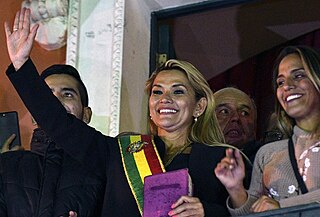
A political crisis occurred in Bolivia on 10 November 2019, after 21 days of civil protests following the disputed 2019 Bolivian general election in which incumbent President Evo Morales was initially declared the winner. The elections took place after a referendum to amend the Bolivian constitution, which limits the number of terms to two, was rejected in 2016. In 2017 under political pressure and a legal demand from the Morales government, the Constitutional Tribunal (TCP) ruled that all public offices would have no term limits despite what was established in the constitution and allowing Evo Morales to run for a fourth term.

General elections were held in Bolivia on 18 October 2020 for President, Vice-President, and all seats in both the Senate and Chamber of Deputies. Luis Arce of the Movement for Socialism (MAS) party was elected president in a landslide, winning 55% of the vote and securing majorities in both chambers of the Plurinational Legislative Assembly. The results of the election superseded the disputed results of the October 2019 elections, which were annulled during a prolonged political crisis.

Enrique Hertzog assumed office as the 42nd president of Bolivia on 10 March 1947, and his term ended upon his resignation on 22 October 1949. A physician who served in various ministerial positions since the 1920s, Hertzog was elected as the head of the Republican Socialist Unity Party (PURS) ticket in the 1947 general elections.

Gabriel Gosálvez Tejada was a Bolivian politician, journalist, economist, and diplomat. Throughout his political career, Gosálvez held various ministerial officers and diplomatic posts as a member of the United Socialist Party. When that party merged into the Republican Socialist Unity Party, Gosálvez was presented as its presidential candidate in the 1951 general election.
The Government Junta of Bolivia, officially known as the Honorable Government Junta, was a civil junta which ruled Bolivia from 21 July 1946 through 10 March 1947. It consisted of labor, teacher, and student representatives as well as magistrates of the Superior District Court of La Paz. The President of the Junta was Superior District Court President Tomás Monje who was appointed following the violent overthrow of President Gualberto Villarroel on 21 July 1946. As Monje was ill at the time of Villarroel's death, Néstor Guillén, the Dean of the Superior District Court, took charge for the first 27 days before delegating command to Monje on 17 August 1946. As President of the Junta, Monje acted as a neutral figure heading the transition back to civilian government. The junta was dissolved on 10 March 1947 when Enrique Hertzog, winner of the January general election, took office as president.
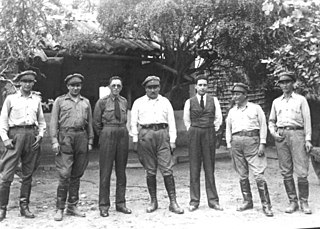
The 1934 Bolivian coup d'état, colloquially known as the Corralito of Villamontes, was a military coup in Bolivia that deposed President Daniel Salamanca in the midst of the Chaco War. Two days before the coup, Salamanca and his presidential delegation arrived at the military headquarters in Villamontes with the intent of removing General Enrique Peñaranda as commander-in-chief of the armed forces and replacing him with General José Leonardo Lanza. In response, on 27 November 1934, army high command directed a group of military officers led by Captain Germán Busch to arrest the president and force his resignation.
References
- ↑ Shaw, Albert (1908). The American Review of Reviews. Review of Reviews.
- ↑ "UN AMOR DESENFRENADO POR LA LIBERTAD: ANTOLOGÍA DE LA HISTORIA POLÍTICA DE BOLIVIA (1825-2020)" (PDF): 349.
{{cite journal}}: Cite journal requires|journal=(help) - ↑ Alves, Ana (2013). "Elites, Resources, and International Violence in South America". PhD Dissertation. doi:10.18130/V3KJ7R.
- ↑ Monthly Bulletin of the International Bureau of the American Republics. U.S. Government Printing Office. 1909. p. 407.
- ↑ Rios, Fernando (2020). Panpipes and Ponchos: Musical Folklorization and the Rise of the Andean Conjunto Tradition in la Paz, Bolivia. Oxford University Press. pp. 62–63. ISBN 978-0-19-069227-8.
- ↑ Beard, C. A.; Hayes, C. H. (1908). "Record of Political Events". Political Science Quarterly. 23 (4): 765. doi:10.2307/2140884. ISSN 0032-3195. JSTOR 2140884.